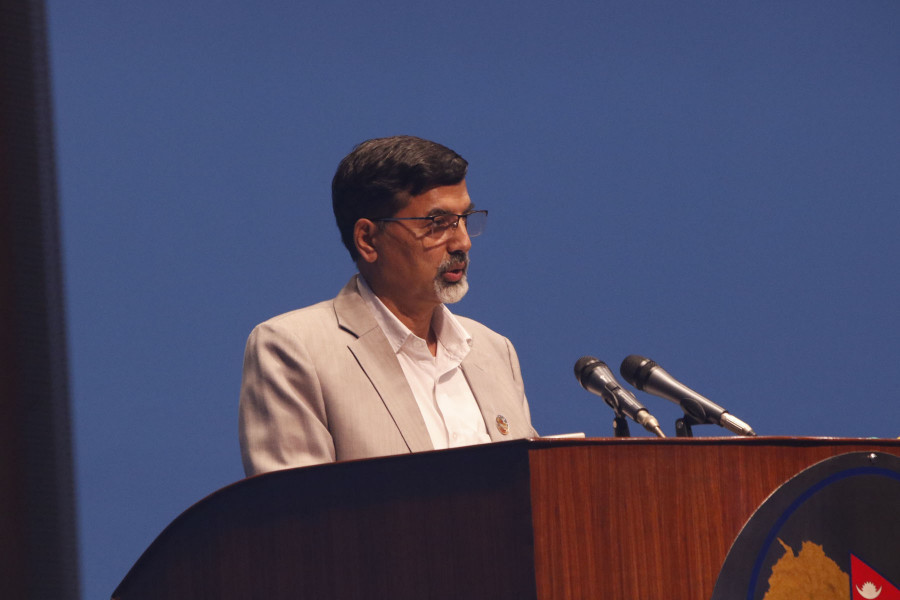Money
Government spent bigly in just four days
A government shutdown situation had halted government spending for several days.
Prithvi Man Shrestha
Of the total budget spent since the start of the current fiscal year, over one-fifth was spent in just four days, after the replacement appropriation bill was endorsed by the National Assembly on September 23.
The government spent Rs24.36 billion between September 24 and September 27, which amounts to 21.28 percent of the total budget spent since the start of the current fiscal year 2021-22.
The government spent Rs114.42 billion by September 27, most of the amount was spent for administrative purposes.
“The main reason behind the spike in spending in just four days is the sudden release of the funds stuck since the second week of September [due to the government shutdown],” said Bhesh Prasad Bhurtel, deputy financial comptroller general at the Financial Comptroller General Office. “With Dashain festival round the corner, funds for paying the Dashain allowance to government employees and ex-employees have been released. We will also release the budget for social security allowance shortly.”
According to him, around Rs8-9 billion has been released for paying the Dashain allowance to government employees while around Rs6 billion has been released to pay government pensioners.
Bhurtel said that about Rs27 billion would be released for social security allowance before Dashain while salaries and pensions for government employees and ex-employees respectively will also be released before the festival leading to heavy government spending.
Budgetary allocation for social security allowances jumped to Rs100 billion this fiscal year from Rs68.65 billion in the previous fiscal year 2020-21.
The government had to halt all spendings except for constitutional bodies and debt repayment, temporarily after the bill introduced to replace the budget ordinance, could not be endorsed within the set deadline.
As per parliamentary rules, a replacement bill of any ordinance should be endorsed by both houses of Parliament within 60 days of the tabling of such ordinance in the federal parliament.
The Deuba government presented the budget ordinance in the House on July 18. Then a replacement bill was tabled to replace the ordinance on appropriation on September 10 which should have been endorsed by parliament by September 15 to pave the way for the government to make spendings.
But, on September 14, the lower house was adjourned until September 20 without endorsing the replacement bill, which prevented the government from spending, a situation known as government shutdown in the US.
But, the government was able to get the bill endorsed by the lower house on September 20 despite House obstruction by lawmakers of the main opposition CPN-UML. On September 23, the National Assembly also endorsed the bill paving the way for the government to spend the budget.
Earlier, continued House obstruction by CPN-UML lawmakers, who alleged that Speaker Agni Sapkota sided with the ruling coalition to allow the CPN-UML to split, had blocked the endorsement of the replacement bill.
Due to the spending ban, government agencies carried out various emergency works on credit. For example, the Department of Roads cleared landslides at various road sections by purchasing fuel for excavators and other equipment on credit from fuel stations.
“We had to carry out maintenance work of a road at Liping area near Tatopani on credit as we were unable to spend from the government treasury,” said Arjun Jung Thapa, director general at the Department of Roads. Now, the passage of the bill has paved the way for the government to spend the budget.
Government spending is expected to grow in the fiscal year’s third month (mid-September to mid-October) as the government maintains its spending records on a quarterly basis. Until the last fiscal year, the government would maintain such records on a four-month basis. “As the government agencies are expected to meet the quarterly target, they are expected to make efforts to spend more in the first quarter,” said Bhurtel.
But, according to the Financial Comptroller General Office, much of the spending has been made under the recurrent heading. For example, the government spent Rs80.21 billion under recurrent heading followed by financing amounting to Rs30.73 billion as of September 27. But, capital expenditure stood at just Rs3.48 billion, according to this office.




 13.12°C Kathmandu
13.12°C Kathmandu













